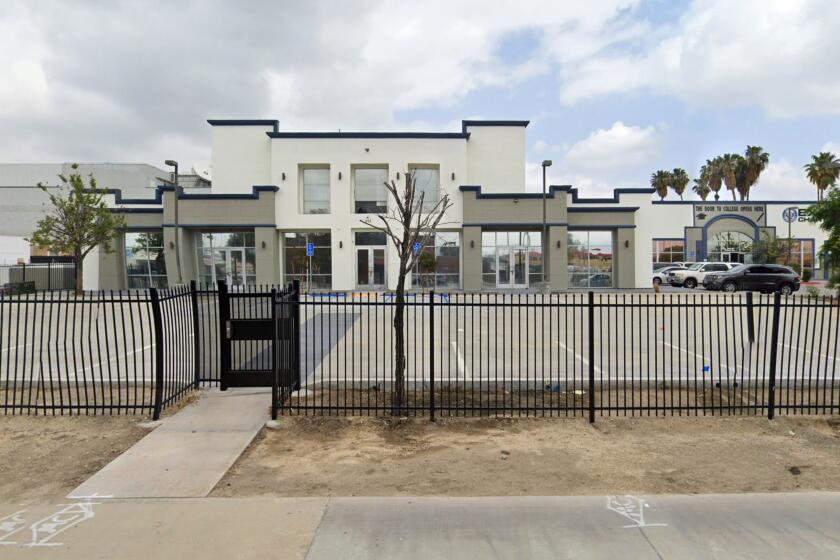Officials Propose Series of Steps to Tighten Security at Seaports
Amid growing concern about the vulnerability of U.S. ports to terrorist attacks, the Bush administration and members of Congress on Thursday pressed for new, stronger measures to safeguard the waterfront--from expanding the Coast Guard’s authority to check ships to requiring background checks of tens of thousands of port workers.
Transportation Secretary Norman Y. Mineta proposed a number of steps to tighten security at the nation’s 361 ports, but several lawmakers want to go much further.
Congress is soon expected to take up legislation that would, among other things, extend to ports some of the post-Sept. 11 measures put into place to protect the air transportation system. These include hiring more sea marshals, providing for U.S. security reviews of foreign ports and requiring U.S. ports to prepare security plans that would restrict access and mandate background checks for employees working in sensitive areas.
The proposals are being closely watched at the Los Angeles-Long Beach port complex, the nation’s busiest with more than 1 million passengers, 5,500 commercial vessels and $170 billion in commerce a year.
Some of the proposals are sure to be controversial.
The International Longshore and Warehouse Union is lobbying against checks on the immigration status and possible criminal backgrounds of dockworkers--even if they work next to volatile and toxic chemicals, cargo vessels and military equipment.
“Background checks are unnecessary and counterproductive,” said Lindsay McLaughlin, the union’s legislative director in Washington. “We are pointing out to Congress that, if they are serious about port security, they must realize the threats are external, not from within.”
Port security, after enactment of new protections for the nation’s air travelers in the wake of the Sept. 11 terrorist attacks on the World Trade Center and the Pentagon, is becoming the next focus for Congress. Some steps already have been taken to beef up security at ports.
At the Los Angeles-Long Beach port complex, the Coast Guard has established a 500-yard security zone around all Navy ships and barred other vessels from coming within 100 yards of them.
The guard also has been conducting random underwater sweeps and 24-hour patrols of all terminals, hazardous materials depots, bridges and cruise liners. “Vessels of concern” must provide 96-hour notice of arrival.
Additionally, port officials a week ago celebrated the first local graduating class of sea marshals, a new corps specially trained to intercept incoming cruise ships, freighters and tankers about 10 to 20 miles at sea. Departing vessels similarly will be searched and escorted by the armed security teams on board and in boats until they are at least 10 miles out.
During separate hearings before House and Senate panels Thursday, lawmakers expressed concern that only a fraction of the 600,000 cargo containers passing through ports every day are inspected.
“You don’t have to hijack a plane,” said Sen. Ernest F. Hollings (D-S.C.), chairman of the Commerce and Transportation Committee. “You can ship a container [filled with an explosive] for $5,000.”
Hollings is sponsoring a bill that would provide about $4 billion in grants and loan guarantees to help finance security improvements at ports--the Los Angeles-Long Beach complex would receive a good chunk of it--and to pay for more Customs Service agents and cargo screening equipment.
Appearing before a House Transportation subcommittee, Mineta urged Congress to empower the Coast Guard to stop a ship’s movement 12 miles off shore--four times the current limit.
“We would rather the guy be farther away from port,” Coast Guard spokesman Capt. Mike Lapinski said. “Because the closer in you get, the higher risk you run.”
Mineta also proposed extending to foreign ports a program now used to determine whether airports in other countries meet international safety standards.
Sen. John F. Kerry (D-Mass.), who is pushing for increased U.S. inspections of foreign ports, said that if such a port does not meet security standards, then U.S. cruise ships could be prohibited from “visiting those ports and bringing our tourist dollars to their economies.”
“We need to demonstrate some resolve--before terrorists find our vulnerabilities and exploit them,” Kerry said. “National security does not begin at our ports and harbors, but rather at the port of embarkation.”
The Bush administration also is pushing to increase funding for the Coast Guard. The Republican-controlled House has approved $145 million instead of the $203 million in emergency funding sought by the administration for the guard. The Democratic-controlled Senate is considering a $273-million figure.
Congress also is poised to improve the Coast Guard’s intelligence-gathering capabilities. House and Senate negotiators agreed this week on language that would make the guard’s surveillance unit part of the U.S. intelligence community, alongside the CIA and other spy agencies.
The move is designed to give the Coast Guard greater access to the nation’s spy resources, said Sen. Bob Graham (D-Fla.), chairman of the Senate Intelligence Committee. As an example, Graham said the Coast Guard would have new authority to direct U.S. satellites at overseas ports suspected of loading weapons, drugs or other illicit cargo aimed at U.S. shores.
“Every day, [thousands of] containers around the world are delivered to U.S. seaports and less than 3% are inspected,” Graham said. “We need to make sure they’re the right 3%.”
Simon reported from Washington, Sahagun from Los Angeles. Times staff writer Greg Miller contributed to this report.
More to Read
Start your day right
Sign up for Essential California for news, features and recommendations from the L.A. Times and beyond in your inbox six days a week.
You may occasionally receive promotional content from the Los Angeles Times.








